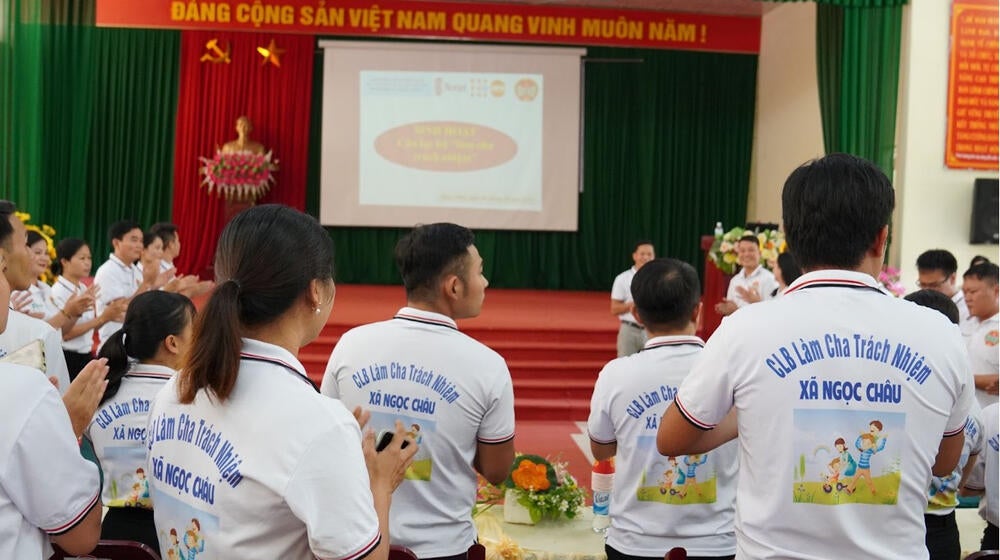News
How UNFPA is engaging men and boys to shift damaging attitudes and further gender equality
- 10 July 2023
News
BAKU, Azerbaijan/BAC GIANG, Viet Nam – For many people, finding out their baby’s birth sex is a cause for celebration – revealing the son or daughter they always dreamed of having. For others, it can be a source of crushing anxiety – particularly if they think it might be a girl.
To this day, women and girls are systematically undervalued compared to men and boys, despite gender equality being a proven precondition for advancing development and reducing poverty. Empowered women and girls lead to healthier and more productive families, stronger economies and brighter futures for the next generations.
Yet in many countries, boys’ education and employment opportunities are still prioritized while girls are at risk of being forced into early or child marriage to alleviate financial pressure on families. Globally, women still only make 77 cents for every dollar a man earns, and they carry out at least 2.5 times more unpaid work than men.
At the more extreme end of these biased gender norms is the issue of son preference, whereby female-determined pregnancies are terminated, many times forcibly; those who refuse to be coerced can be at risk of exclusion, violence and abandonment by their partners and family.
Son preference has led to an estimated 140 million "missing" women and sex ratios at birth sometimes skewed in favour of boys. Such a gender imbalance can have lasting and damaging impacts on societies and stifle women’s and girls’ professional progression. It can also incur higher rates of other harmful norms, including gender-based violence, female genital mutilation and child marriage – all of which present a formidable barrier to achieving gender equality.
Redressing the balance
Below we look at how UNFPA, the United Nations sexual and reproductive health agency, is launching programmes across several countries to counter this discrimination and equip men and boys in particular to advocate against it.
Because as UNFPA Executive Director Dr. Natalia Kanem said on World Population Day, “When we unlock the full potential of women and girls – encouraging and nurturing their desires for their lives, their families and their careers – we galvanize half the leadership, ideas, innovation, and creativity to better society.”
Challenging norms at ‘Papa School’ in Azerbaijan
In a country where son preference remains widespread, father-of-two Tofig Sadikhov said that after his daughter was born and his wife became pregnant again, relatives and friends constantly reminded him of the importance of “a brother for a sister”.
But Mr. Sadikhov only wished for one thing: A healthy baby. Boy or girl, he and his wife believed a child to be a blessing. In Azerbaijan however, many others feel differently. Their reasons can be financial, as inheritance and land rights pass primarily through male family members in Azerbaijan, and men often earn higher incomes. Social norms also relegate certain religious and cultural rituals to sons.
Yet even entrenched stereotypes can be challenged, with one example being UNFPA’s Papa School in Azerbaijan. The initiative provides coaching for men to become more engaged and equal partners, as well as a safe space to discuss and discover how gender discrimination affects them, their families and society.
Mr. Sadikhov said many men approached him after sessions to express their regret over persuading their partners to terminate female-determined pregnancies.
"During conversations and training with hundreds of fathers, it was inspiring to witness the transformation of their attitudes, to observe the atmosphere of mutual respect, confidence and trust, and to see how many of them were becoming better versions of themselves,” he said.
Rising up for gender equality in Viet Nam

More than 5,000 miles away in Viet Nam, Mr. Nguyen* was dealing with similar pressures: After fathering two girls, he had started researching ways to ensure his wife’s next pregnancy yielded a son.
His thought process reflects gender roles deeply rooted in Vietnamese society. “What's important is to continue the family line, because my father is the eldest child and I am his only son”.
According to Viet Nam’s 2019 census, the sex ratio at birth was 111.5 boys to 100 girls that year – higher than the biologically normal ratio of about 105 boys to 100 girls. This distortion is driven by gender-biased sex selection, without which an estimated 45,900 female births would occur in the country each year.
To work against this, UNFPA collaborated with the Government of Viet Nam and the Viet Nam Farmers’ Union to set up ten Responsible Fatherhood Clubs in the provinces of Bac Giang and Ba Ria-Vung Tau. The clubs provide a space to learn about gender roles in society, raising children and overcoming the pressure to have sons. More broadly, they have been shown to lead more men to take on household responsibilities, and to fewer people agreeing that every family must have at least one son to continue the family line.
Mr. Nguyen said he worries less about who will take care of him and his wife in their old age or about having more children. “If daughters are well behaved and successful, that’s good enough.”
Tackling gender inequality has proven, enduring benefits for all of society: But awareness of their value and contributions is essential to changing harmful behaviours and beliefs. As another Responsible Fatherhood member said, “I previously yearned for a son. But after being part of the club, I understood that the gender of my child is insignificant as long as I am able to raise them well”.
* Name changed for privacy and protection